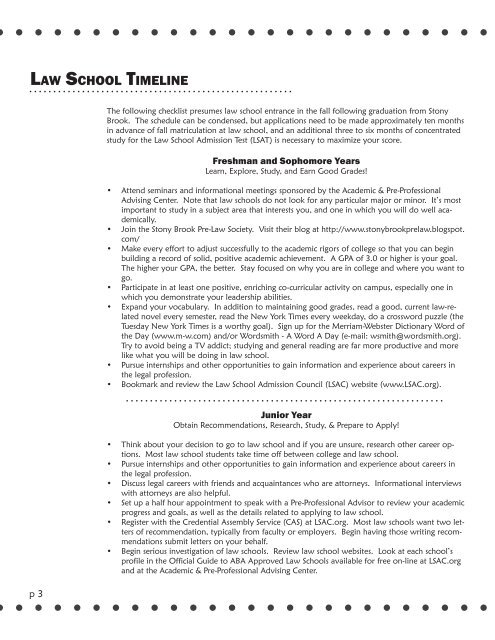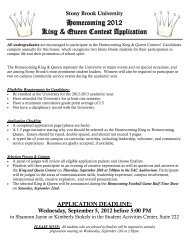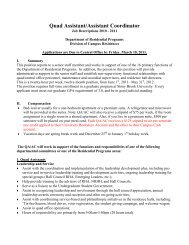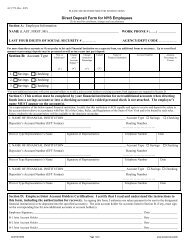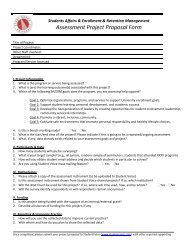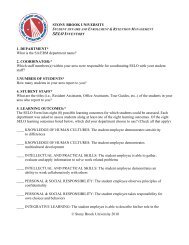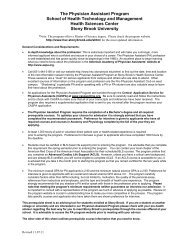PreLaw Guide - Student Affairs - Stony Brook University
PreLaw Guide - Student Affairs - Stony Brook University
PreLaw Guide - Student Affairs - Stony Brook University
You also want an ePaper? Increase the reach of your titles
YUMPU automatically turns print PDFs into web optimized ePapers that Google loves.
Law School Timeline<br />
The following checklist presumes law school entrance in the fall following graduation from <strong>Stony</strong><br />
<strong>Brook</strong>. The schedule can be condensed, but applications need to be made approximately ten months<br />
in advance of fall matriculation at law school, and an additional three to six months of concentrated<br />
study for the Law School Admission Test (LSAT) is necessary to maximize your score.<br />
Freshman and Sophomore Years<br />
Learn, Explore, Study, and Earn Good Grades!<br />
• Attend seminars and informational meetings sponsored by the Academic & Pre-Professional<br />
Advising Center. Note that law schools do not look for any particular major or minor. It’s most<br />
important to study in a subject area that interests you, and one in which you will do well academically.<br />
• Join the <strong>Stony</strong> <strong>Brook</strong> Pre-Law Society. Visit their blog at http://www.stonybrookprelaw.blogspot.<br />
com/<br />
• Make every effort to adjust successfully to the academic rigors of college so that you can begin<br />
building a record of solid, positive academic achievement. A GPA of 3.0 or higher is your goal.<br />
The higher your GPA, the better. Stay focused on why you are in college and where you want to<br />
go.<br />
• Participate in at least one positive, enriching co-curricular activity on campus, especially one in<br />
which you demonstrate your leadership abilities.<br />
• Expand your vocabulary. In addition to maintaining good grades, read a good, current law-related<br />
novel every semester, read the New York Times every weekday, do a crossword puzzle (the<br />
Tuesday New York Times is a worthy goal). Sign up for the Merriam-Webster Dictionary Word of<br />
the Day (www.m-w.com) and/or Wordsmith - A Word A Day (e-mail: wsmith@wordsmith.org).<br />
Try to avoid being a TV addict; studying and general reading are far more productive and more<br />
like what you will be doing in law school.<br />
• Pursue internships and other opportunities to gain information and experience about careers in<br />
the legal profession.<br />
• Bookmark and review the Law School Admission Council (LSAC) website (www.LSAC.org).<br />
p 3<br />
Junior Year<br />
Obtain Recommendations, Research, Study, & Prepare to Apply!<br />
• Think about your decision to go to law school and if you are unsure, research other career options.<br />
Most law school students take time off between college and law school.<br />
• Pursue internships and other opportunities to gain information and experience about careers in<br />
the legal profession.<br />
• Discuss legal careers with friends and acquaintances who are attorneys. Informational interviews<br />
with attorneys are also helpful.<br />
• Set up a half hour appointment to speak with a Pre-Professional Advisor to review your academic<br />
progress and goals, as well as the details related to applying to law school.<br />
• Register with the Credential Assembly Service (CAS) at LSAC.org. Most law schools want two letters<br />
of recommendation, typically from faculty or employers. Begin having those writing recommendations<br />
submit letters on your behalf.<br />
• Begin serious investigation of law schools. Review law school websites. Look at each school’s<br />
profile in the Official <strong>Guide</strong> to ABA Approved Law Schools available for free on-line at LSAC.org<br />
and at the Academic & Pre-Professional Advising Center.


